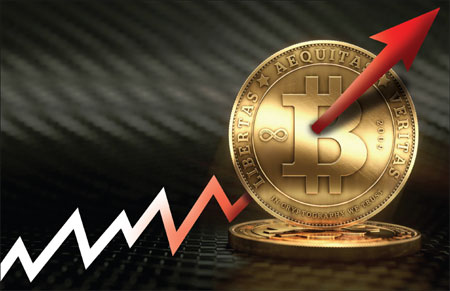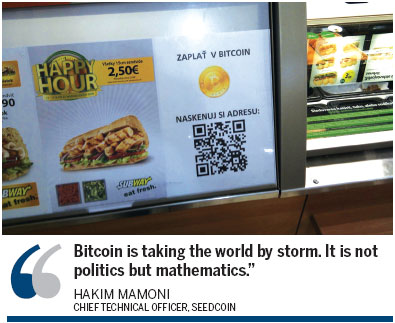Bitcoin: struggling for currency
Updated: 2013-11-22 07:18
By Alfred Romann(HK Edition)
|
|||||||||
Despite the fact that there is almost nowhere to spend Bitcoins in Hong Kong, locally based entrepreneurs, traders and consultants are playing an increasingly important role in the growing crypto economy based on digital currency. Alfred Romann writes.
Hong Kong has yet to embrace Bitcoin, the digital currency that can pass from person to person anywhere round the world, virtually in secret and beyond the reach to standard currency controls. The city's entrepreneurs, however, are moving quickly to get in on the ground floor.
The new Hong Kong-based Asia Nexgen Bitcoin Exchange has already opened for business. Seedcoin, an investor in Bitcoin and an incubator for Bitcoin-related businesses, has set up shop in Hong Kong. The largest Bitcoin scam to date was executed by a Hong Kong registered company, Global Bond Ltd. That bit of legerdemain cost investors $4.1 million when Global Bond's principal vanished into the ether, and all for a currency that's all but worthless in Hong Kong's day to day commerce. You might get a massage in a couple of places.
The founder of Seedcoin, Eddie Travia, organized a conference in Singapore earlier this month. The director of compliance at Matrixvision, which works with companies to set up compliance structures, is based in Hong Kong.
Bitcoin is not backed by the central banks of any government capable of floating beneath the radar and outside the gaze of governments. It's a digital currency or crypto currency that's stored in so-called "wallets" online or offline. Users can "buy" bitcoins by walking into exchanges like itBit, BTC China, Mt Gox or Asia Nexgen and paying with dollars, yuan, euros, or whatever is legal tender. They can also be obtained from the sale of goods and services. Some vendors demand it. Bitcoins may be transferred from one party to another using unique transfer codes or addresses that move the Bitcoin instantly from one wallet to the other. It takes minutes to set up a wallet.
You can transfer bitcoins to someone on the other side of the world as rapidly as you can to somebody sitting the in the same room. It's this ability to move cash instantaneously that contributes to the growing popularity of the virtual currency.
Despite its flexibility and increasing global notoriety, Bitcoin remains more of an economic and commercial curiosity. Its market capitalization is believed to be somewhere in the $7.5 billion range, as of Nov 20. That is a tiny fraction of the $1.2 trillion in circulation in banknotes from the US Federal Reserve or the 5.5 trillion yuan (US$900 billion) in China's coin of the realm.
In terms of foreign exchange trading, Bitcoin barely registers. On any given day, the value of trades between the USD and the Euros (just that one pair) is about $1.3 trillion, according to the Bank for International Settlements. That amounts to slightly less than a quarter of one side of the total foreign exchange traded.
The growing debate over bitcoin centers on the relatively paltry amounts that are exchanged on global markets, an issue which clearly limits the currency's value and contributes to volatility.
Underlying all the concerns, fears and hopes of Bitcoin users is volatility. The value of a unit of the digital currency skyrocketed, plummeted and then recovered to the tune of around 40 percent in the space of just a few minutes on November 18. The value of Bitcoin has been changing so fast that by the time newspapers are printed and delivered, pieces of data, like price and market valuation, are likely to be out of date.
Bitcoiners say speculators on the Chinese mainland have been driving up the value of the currency since May but it's been only in the past couple of weeks that Bitcoin has raised eyebrows and attracted serious global attention. The value of a Bitcoin on exchanges around the world hit $750 on Tuesday, double the price of a week earlier. For a few minutes, Bitcoins traded above $1,000 on BTC China, the largest Bitcoin exchange in the country, before crashing down to $600 and then climbing back above $700.
Passing fad?
The vertiginous rise in the value of Bitcoin, a digital currency with no central authority to speak of and an infrastructure very few people understand, is leading many to question whether this may be a passing fad, a speculative bubble being inflated by gamblers.
"The time is right for the markets to experiment with other forms of money," said Edan Yago, CEO of Epiphyte, a company that is building payment protocols.
Bitcoin is rooted in Asia. The mysterious creator of Bitcoin was a Japanese man or a group using the Japanese pseudonym, Satoshi Nakamoto. The largest exchanges in the world are in Japan and China. Other exchanges have popped up in Australia and Singapore. A conference in Shanghai this week follows the one in Singapore last week.
For the time being, Bitcoin has little practical value. Only a handful of places will accept Bitcoins, even though the number seems to be growing, particularly in Germany and in Vancouver, Canada. Some online vendors accept Bitcoin in China and at least one real estate company is allowing people to use Bitcoin to buy property.
Still, Bitcoin is most useful as a trading tool or a means to profit from the arbitrage of the price between the different exchanges. That has attracted hundreds of thousands - if not millions - of Bitcoin buyers.
In China, the dominant player is BTC China, the Chinese Bitcoin exchange recently received US$5 million in funding from Lightspeed China Partners. BTC is one of about 17 different transaction platforms in China but it's the largest.
There still are serious issues to be addressed.
One is trust. Currencies are based on the trust users place on the issuer. A banknote, whether it is a yuan, dollar or yen, is much like a check issued by a central authority at a specified value to the user. That value of that banknote or bill is backed by the assets and economy of the issuer, in this case China, the United States, or Japan.
The value of Bitcoin is determined entirely by the market. It is worth whatever buyers say it is worth. It has no intrinsic value. It behaves more like a company stock than a currency, although a stock traded in an exchange is often backed by the assets and operations of the business that issues it.
Issues of concern
"Anyone can put software in a computer and be working towards adding block chains," said Hakim Mamoni, chief technology officer (CTO) at Hong Kong's Seedcoin. Block chains are the complex trails that back the legitimacy of Bitcoins and are based on complex cryptography and mathematical formulas.
A second issue of concern is regulation. Both fiat currencies and stocks are regulated. There is no regulation associated with Bitcoin. Hearings in the US to determine what Bitcoin is and how to regulate it got underway on Nov 18 but that is only the first step. Germany and Canada may be leading the way but they are achieving this for the most part by staying out of it.
China has no regulation of Bitcoin although it did put forward rules in 2009 that banned the use of digital currencies. Those rules were aimed at Q Coins, a digital currency developed by the Internet company Tencent to use in its online games that evolved quickly and became a proxy for real money in China.
A third issue is liquidity. For the time being, there is not that much of it. There are more than 10 million bitcoins out there, about half the theoretical maximum of 21 million, but even with tens of thousands of active traders there are not enough to create stability.
In this sense, Bitcoin is not unlike a company stock with low trading volume. A single transaction can send the value of the currency way up or way down.
A fourth issue is trust. Buyers must rely on the exchanges where they buy Bitcoins. They also have to trust the security of the virtual "wallets" where Bitcoins are stored. That is not always easy.
"A ridiculous number of Bitcoin wallets have been stolen in the last three years. Some of them with US$5 million. Bank heists don't get that good," said Kyle Drake, a US wallet developer.
Trust covers other areas as well. This month, Singapore authorities declared Bitcoin transactions are not covered by consumer protection laws and without some kind of consumer protection "this is going nowhere," said Steve Beauregard, who has launched GoCoin in the US after a career as a developer and distributor of Blackberry in Hollywood.
On the other hand, there are plenty of potential uses for Bitcoin or some kind of digital currency that does not require banking services.
"The big opportunity that I see is the unbanked people who cannot participate in the online economy," said Beauregard.
This is one aspect. Some, like Seedcoin's Chief Technology Officer Hakim Mamoni, have hopes that Bitcoin will eliminate the global need for monetary policy or take money out of global politics.
"Bitcoin is taking the world by storm," said Mamoni. "It is not politics but mathematics."



(HK Edition 11/22/2013 page2)